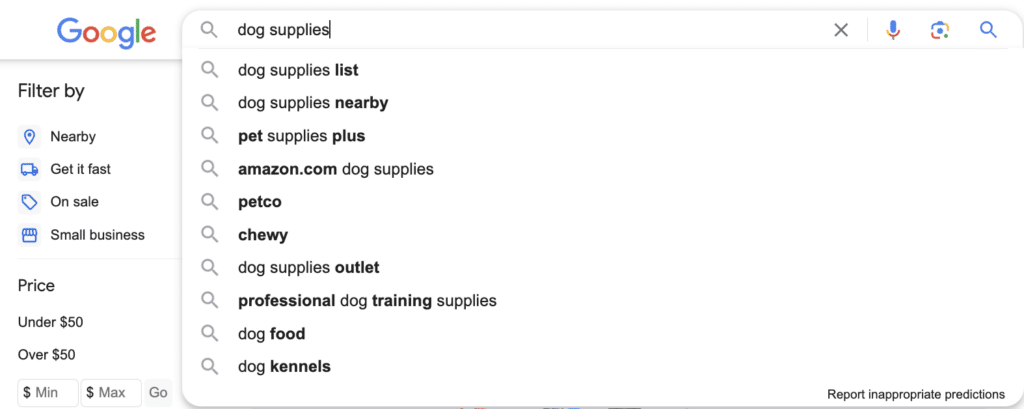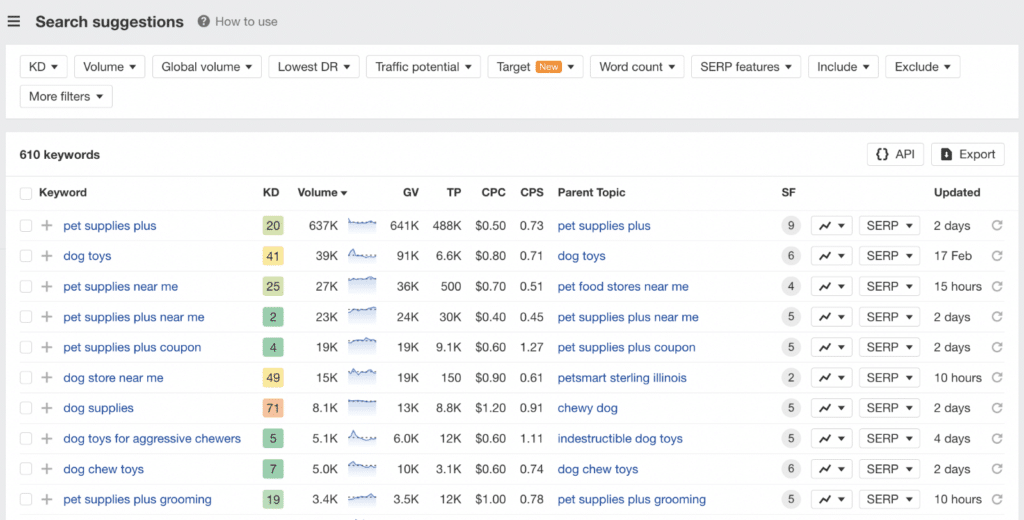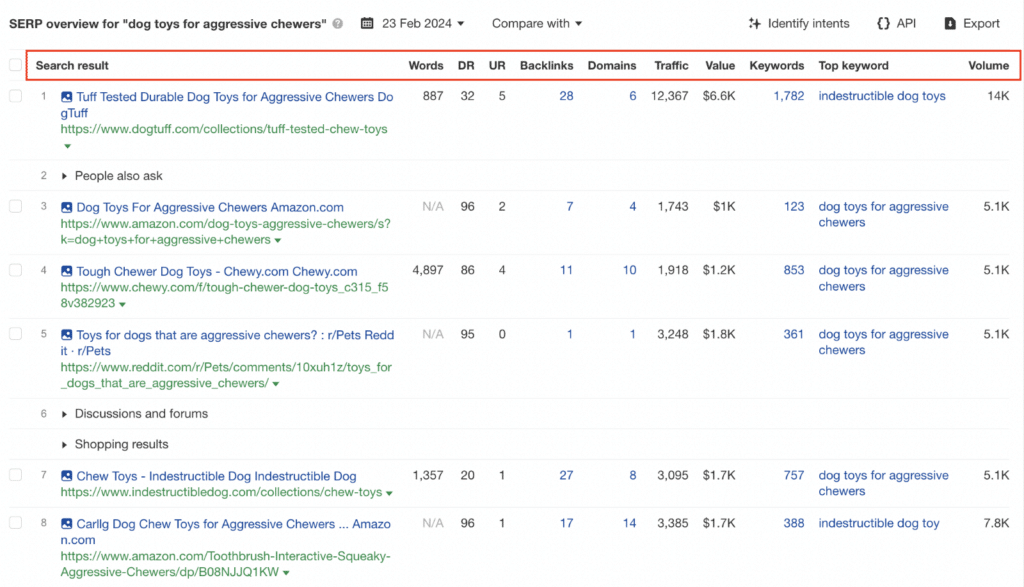Why is keyword research important? Search engine optimization is all about crafting content that meets the needs of users who are searching for relevant keywords. As a result, no matter how good your content is, no one is likely to find it if it doesn’t focus on the right keywords.
Keyword research is how you determine which keywords to feature in your content. With a keyword index that contains 16.2 billion keywords, Ahrefs is one of the most powerful keyword research tools. This guide will teach you how to use Ahrefs for keyword research.
How To Get Started With Keyword Research
Keyword research is the process you use to identify the words and phrases your target market is most likely to search for. Complete these steps to get started.
Identify Your Company’s Seed Keywords
Keyword research tools need a starting point, called a seed keyword, to generate keyword ideas. To identify your seed keywords, think about what a potential customer might type into a search engine to find your products and services.
For example, if you sell pet supplies, customers might search for words such as:
- Leashes
- Pet food
- Kitty litter
- Dog training tools
These are broad topics that you won’t necessarily focus your content on. Instead, you will use them later in the keyword research process.
Understand Keyword Research Terms
If you are new to search engine optimization, you may be unfamiliar with the lingo. These are a few of the most common keyword research terms you need to understand:
- Keyword difficulty, or KD, is a score SEO professionals assign to a keyword to indicate how difficult it is to rank for. In Ahrefs, keywords with a score of 0-10 are easy, while keywords with a score of 71-100 are very difficult.
- Search volume measures how often people search for a keyword every month.
- Traffic potential estimates how much traffic you can expect to get from a keyword you rank well for.
- Cost per click, or CPC, is the average amount of money advertisers will pay for a click on an ad that displays at the top of search results for a specific keyword. SEO professionals use this figure to estimate the commercial value of a keyword.
As you learn more about how to use Ahrefs for keyword research, you may discover that different tools use these terms in different ways.
Get Keyword Ideas From Competing Websites
Identifying which keywords your competition ranks well for will give you some ideas about good keywords to focus your content on. Start by typing your seed keywords into Google and looking at the pages at the top of the search results.
If none of these pages resemble your site, search for more specific keywords. For example, if you type in the word “dog” and get results about different dog breeds, you might try searching for “dog supplies” instead.
Once you find some competitor sites, use Ahrefs’ Site Explorer tool to discover which pages on their site get the most traffic and which keywords those pages target. Repeat this process for as many competing sites as you can and use the “Competing Domains” report in Site Explorer to find more sites to research.
How To Use Ahrefs for Keyword Research for Your Website
To use Ahrefs for keyword research, navigate to the Keyword Explorer tool and follow these steps.
Enter Your Seed Keyword
Type your seed keywords into the tool to generate a report with in-depth SEO metrics that will help you choose the keywords to focus on. You can select the specific country or countries you want to get metrics for.
Analyze Matching and Related Terms
Keyword Explorer will use its database to generate a list of keywords similar to the seed keywords you input. To access these suggestions, use the “Matching terms,” “Related terms,” or “Search suggestions” reports under the “Keyword ideas” menu.
- Matching terms: Keyword ideas that contain your target keywords. If the seed keyword you entered was “dog supplies”, all of the matching keywords will contain “dog supplies”, such as “dog grooming supplies”.
- Related terms: Keywords that rank alongside the word or phrase you put in—for example, keywords most commonly ranked along with “tomato soup” are “tomato soup recipe” and “homemade tomato soup”. However, unlike the Matching Keyword function, you’ll also see terms that don’t include your phrase, like “cream of bacon soup”.
- Search suggestions: Common search engine autocomplete suggestions for your target keyword, along with SEO metrics for each suggestion.


Study the SERP Overview
The SERP Overview shows you what the first page of search results for your keyword looks like and displays important SEO metrics that will help you use Ahrefs for keyword research. Studying this overview will give you an idea about why the pages that rank the best for a given keyword are ranking well.

In the SERP overview for the keyword “dog toys for aggressive chewers”, we can see the following metrics:
- Search result: The page title and URL of the content that is ranking for the chosen keyword.
- Words: The number of words on the page—you may see “N/A” for forum sites/sites with review or comment sections, like Amazon and Reddit.
- DR: DR stands for “Domain Rating”. On a scale of 0-100, how influential is this site? In the example above, Amazon has a DR of 96 because it’s a site that is well-known and frequently referenced. Knowing the DR of your website can help you see how you stack up to your top competitors.
- UR: UR stands for “URL rating”. This is similar to DR, but instead of assessing the entire website, it’s an assessment of just that one particular URL. So while you’ll see Amazon pages have very high DR, the URL rating of individual product pages is typically low.
- Backlinks: The number of backlinks from other websites that link to the search result. Pages with a high number of backlinks are often more influential than pages without many backlinks.
- Domains: The number of unique domains that link back to the search result. Because a single domain can have many backlinks to a website, the number of unique domains is a better way to assess a site’s influence than backlinks alone.
- Traffic: The estimated number of organic visits that page receives each month. This estimate is based on ALL of the keywords the page is ranking for, their search volume, and their position. The higher the rankings, the higher the estimated traffic—for example, the site ranking #1 for “dog toys for aggressive chewers” is going to receive more traffic from that query than the site ranking #5, because 25% of searchers click the first result.
- Value: The estimated value of a search result is based on the CPC (cost per click) of the keywords it’s ranking for. The keyword “dog toys for aggressive chewers” has an average CPC of $0.60—if you were to pay for a search ad targeting that keyword, you’d have to pay $0.60 every time someone clicked your ad. But by ranking organically for that term instead, every organic click= $0.60 back in your wallet. Ahrefs does the math for you, using the CPC, search volume, and ranking positions for all of the keywords a search result is ranking for to estimate that page’s value.
- Keywords: The total number of unique keywords a search result is ranking for—clicking this number will show you a list of those keywords, giving you more ideas for your own content.
- Top Keyword: The keyword driving the most traffic to that search result. This can help you find keyword synonyms, like “indestructible dog toys”.
- Volume: The average monthly search volume for the top keyword.
Use Ahrefs Tools To Analyze Target Keywords
Keyword Explorer allows you to see:
- Global search volume for any keyword
- Keyword difficulty
- Traffic potential
- Clicks per search (CPS)
- Cost per click (CPC)
You can also get a detailed history of the SERP position for target keywords and assess whether you can rank for your target keyword while targeting a more general topic. Using these tools will help you identify the keywords that provide the most SEO bang for your buck so that you can focus your content around them.
How To Improve Your Keyword Research
Once you know how to use Ahrefs for keyword research, you can begin fine-tuning your process to get the best results. These tips can help.
Perform an SEO Audit
You need to know how your pages are currently performing before you can make improvements. Digital Neighbor offers cutting-edge technical SEO audits that will pinpoint exactly how you can improve your site.
Try Keyword Mapping
It is counterproductive to try to stuff all your keywords into one piece of content. The keyword mapping process helps you determine how to distribute keywords across your site.
Stay Focused on Your Target Audience
In the quest to get the top ranking, it is easy to forget that search engines base rankings on what users are searching for. It won’t do you much good to rank well for keywords that your customers aren’t searching for.
How To Save Time on SEO
Now that you know how to use Ahrefs for keyword research, are you worried you don’t have the time and resources to use the tool effectively? At Digital Neighbor, we’re experts in keyword research for SEO and local SEO. Let us handle SEO planning for you. Schedule a free appointment right away.



